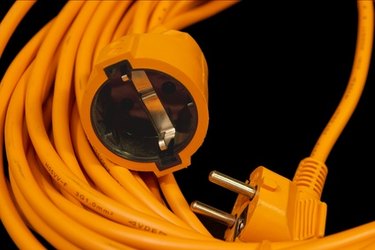
Damaged extension and appliance cords are responsible for many home electrical fires. They are prone to damage from many causes and should always be inspected before use. Knowing a "good" cord from a "bad" one is important.
Plugs
Video of the Day
The only non-flexible parts of a cord are the plugs. This makes them vulnerable to knocks, and crushing and flexing damage when, for example, they are dropped, run over by vehicles or trapped in door or window frames. Cracked and broken plugs may expose you to live components and permit water to enter and cause a short circuit.
Video of the Day
Insulation
Cut, crushed or damaged insulation may expose live wires and allow water to enter the cord. It creates a risk of fire, electric shock and death. The outer insulation should be present where the cord enters the plug and must continue as far as the cord grip within it.
Broken Wires
A fizzing sound from either plug, or a power supply that becomes intermittent, may indicate a loose or broken wire. Broken and loose wires cause "arcing," tiny sparks of electricity jumping across the gap in the wire. This creates heat and may eventually melt the cord or set it on fire.